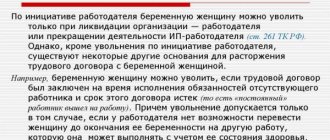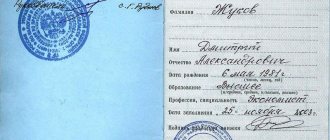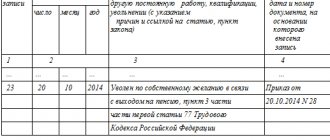Changing jobs is often accompanied by the need to undergo a probationary period. This condition may be included in the employment contract by the employer. The goal is to check the compliance of skills and abilities with the position that the applicant is going to occupy. The employee can also use this period to determine how the new job meets his expectations and goals. If, when passing the test, a citizen concludes that the job is not suitable for him, he can take the initiative and quit. Next, we tell you how voluntary dismissal occurs during a probationary period.
How to fire an employee during the probationary period if, based on the results, he did not pass it ?
How to argue for dismissal
To dismiss an employee during a probationary period, you need to warn him about this in writing, indicating the reasons.
You are required to give notice no later than 3 days before dismissal. The reason for dismissal cannot be personal hostility. Evaluate only business qualities and work results. If you understand that a person cannot cope with his responsibilities or does not meet the required competencies, indicate so in the order. You cannot write that the employee did not suit you in spirit or simply did not like you. It can be formulated in this way:
- the employee filled out documents incorrectly;
- behaved unprofessionally at a meeting with a customer;
- did not fulfill the plan;
- was systematically late for work.
The law calls these reasons "unsatisfactory test result." You can appeal to general reasons for terminating an employment contract (listed in Article 81 of the Labor Code of the Russian Federation), to job descriptions and internal regulations of the company (for example, to the charter).
If objective reasons are not specified, the court may declare the dismissal illegal.
Can they be fired during the probationary period?
Often, when hiring a new employee, the terms of the contract specify a period during which his professional qualities can be identified and assessed.
This period of time helps the parties understand the feasibility of further relationships. The probationary period may vary in length depending on the position held. A probationary period is not provided for:
- pregnant women;
- women raising children under 1.5 years of age;
- persons under 18 years of age;
- graduates of educational institutions.
Employees under fixed-term contracts with a duration of no more than 2 months, as well as persons hired by transfer, and other citizens do not fall into this category (Article 70 of the Labor Code of the Russian Federation).
NOTE! The employer has the right not to require confirmation of the status of the persons listed above. Therefore, the employees themselves must present documents confirming this situation.
A probationary period is established only when hiring a new person. If there is a need to transfer an already working employee to another position, a probationary period is not provided.
The duration of the probationary period and other conditions should be specified in the employment contract, and also reflected in the order when hiring. Further changes to these conditions are permitted only by agreement of the parties.
For most employees, the duration of the probationary period is 3 months; at its discretion, the employer may limit it to a shorter period. For applicants for management positions, including chief accountants, the probationary period can be extended to 6 months. If the contract is concluded for a period of 2 to 6 months, the trial period lasts up to 2 weeks.
The reasons for dismissal during a probationary period may be the same as for termination of a contract in other situations. Moreover, in case of unsatisfactory performance of the hired employee, the employer has the right not to pay severance pay.
Find out about other dismissal options from the material “How to properly arrange leave followed by dismissal?”
For more information on how to make the final payment upon dismissal, see the material “Calculation of compensation for unused vacation under the Labor Code of the Russian Federation” .
Not only dismissal during a probationary period, but also dismissal of a missing employee has important features. And ConsultantPlus experts talk about them in detail. Get free demo access to K+ and go to the Ready Solution to find out all the details of this procedure.
Dismissal procedure
Make a decision on time
If the probationary period has ended and you have not reported your dismissal, it means that the employee has successfully passed the test (Article 71 of the Labor Code of the Russian Federation), and he can be dismissed only on a general basis, as when terminating an employment contract. You have the right to make a decision at any time during the probationary period, but a maximum of 3 days before its end. You cannot fire an employee on the last day of probation.
Collect evidence
They will be needed if you have to prove the legality of dismissal in court or explain to an employee the reason for your actions.
The evidence will be:
- acts of product damage;
- explanatory notes about the reasons for the violation of order;
- memos from colleagues about low productivity results;
- memos from heads of structural units about violations of labor discipline (lateness, absenteeism, etc.);
- medical examination of an employee who is drunk at work;
- orders imposing disciplinary sanctions.
Give notice
Inform the employee in writing of the upcoming dismissal. Please indicate in your notification:
- the reason for termination of the employment contract with reference to the article of the Labor Code of the Russian Federation;
- evidence of violations by the employee;
- date of dismissal.
Print out the written warning in two copies. The employee will take one copy for himself, and sign the other and leave it with you. This is necessary in case of litigation.
Sign the order
Termination of the probationary period and the employment contract with the employee is formalized by order (instruction). Be sure to indicate the objective reason for dismissal.
Unified order form N T-8, approved by Resolution of the State Statistics Committee of Russia dated January 5, 2004 N1
How to dismiss an employee during the probationary period and after it at the initiative of the employer?
Hiring an employee with a mandatory probationary period is accompanied not only by a record of this condition in the employment contract. It is necessary to draw up a list of requirements and tasks, the fulfillment of which is mandatory for further enrollment in the staff. Successful completion of the probationary period includes, among other things, the solution of all tasks assigned to the employee.
If an agreement was initially concluded with the employee, which does not stipulate the existence of a probationary period or there is no separate written agreement on this condition, termination of the agreement as dismissal during the probationary period can be easily contested.
Dismissal of an employee during a probationary period, committed at the initiative of the employer, must be accompanied by a warning to the employee about the upcoming fact 3 days in advance (Article 71 of the Labor Code of the Russian Federation). To do this, the employee is given a written notice containing the reasons for dismissal and the date of termination of the contract.
Determining the timing of the test has its own characteristics. This period is set in calendar days, including weekends and holidays. However, the absence of an employee from the workplace due to other situations, including illness and unknown reasons, is not included in the probationary period.
If the end of the probationary period falls on a non-working day, then the last day of performance of official duties in this status is considered to be the previous working day. That is, if the employer nevertheless decides to dismiss the employee during the probationary period, then the notice will need to be given in advance.
As soon as the probationary period comes to an end, the employee is considered accepted for the position, unless otherwise specified in the employment contract. The simplified dismissal procedure available to employers during a probationary period is no longer valid, and the employee is subject to the rules in force for ordinary employment.
Let's consider whether they can be fired if the employee fails to cope with the assigned obligations and the probationary period has not yet ended.
Entry in the work book
If you are registered with an enterprise using a work book, the organization’s human resources department must make an entry in it about the reason for your dismissal. It does not include any mention of disciplinary sanctions and reprimands during the probationary period.
An entry in the work book may not be made if the employee has worked at the enterprise for less than five days.
If an employee pays the company at the end of the probationary period, a record of failure to complete this period may not be made in the labor record. According to the Labor Code, it is enough to make a reference to the order by which the employee was dismissed.
Work upon dismissal is a standard requirement under the Labor Code of the Russian Federation. Dismissal at one's own request without service is possible only in exceptional cases. We will consider what these cases are in the article.
You will find all the legal details about the dismissal of an employee at the initiative of the employer in this material.
How many days in advance do I need to submit?
If, during the probationary period provided for by the terms of the employment contract, the tested employee realized that the assigned work was not suitable for him for one reason or another (for example, low salary, inconvenient work/rest schedule, poor relationships in the team, or, alternatively, the test subject’s own lack of confidence in own strength), he has the right to terminate this employment relationship on his own initiative. This is provided for in Part 4 of Article 71 of the Labor Code of the Russian Federation. In this case, a corresponding written statement (warning) is sent to the employer 3 (three) days before the date of the upcoming dismissal.
A probationary employee may submit a letter of resignation during the probationary period in the following ways:
- In person to an authorized representative of the employer (optionally, through the office of the company director).
- By post – by registered mail with return receipt requested. This option is often practiced if the employer is absent for a long time or for some reason refuses to accept an application from the tested employee.
Another recommendation is to draw up a letter of resignation in two identical copies. One copy is given to the employer (through his office). The second applicant keeps it for himself - with a note of acceptance. This will help confirm compliance with the law if controversial situations arise in the future.
How to write a resignation letter:
- at your own request;
- in connection with retirement.
Article 71 of the Labor Code of the Russian Federation. Result of the pre-employment test (current version)
1. The employer has the right to make a decision on the incompatibility of the employee with the work assigned to him only during the period established for the test. He has no right, incl. and with the consent of the employee, extend (increase) this period. Having recognized the test results as unsatisfactory, the employer must terminate the employment contract with the employee. Moreover, during the probationary period, the employment contract with the employee can be terminated at any time as soon as facts of the employee’s incompatibility with the work performed are discovered. The employer is obliged to notify the employee of the termination of the employment contract with the employee due to unsatisfactory test results no later than three days in advance.
The employer’s obligation to notify the employee of termination of the employment contract with him in the event of an unsatisfactory test result is an additional guarantee that ensures the protection of the employee’s rights upon dismissal.
However, if the test period has expired and the employee continues to work, he is considered to have passed the test. In this case, the issuance of any special order on final hiring is not required. Subsequent dismissal of such an employee is permitted only on general grounds.
2. Another additional guarantee for an employee upon termination of an employment contract with him in connection with unsatisfactory test results is provided for in Part 1 of Art. 71 the employer is obliged to indicate in writing the reasons that served as the basis for recognizing the employee as having failed the test. This will allow the employee, if necessary, to more cogently express his objections to the substance of the claims made and determine his further behavior in this situation.
If an employee does not agree with the recognition of the test results as unsatisfactory and the termination of his employment contract on this basis, he has the right to appeal the employer’s decision to court.
3. With an employee who fails the test, the employment contract is terminated on the basis of Part 2 of Art. 71 without taking into account the opinion of the relevant trade union body and without paying severance pay. Dismissal on this basis is dismissal at the initiative of the employer (clause 4, part 1, article 77 of the Labor Code). In this regard, dismissal on this basis must be carried out in compliance with the guarantees established for employees dismissed at the initiative of the employer. In particular, such employees cannot be dismissed during the period of their temporary disability and while on vacation (except in the case of liquidation of the organization or termination of activities by an individual entrepreneur) (Part 6 of Article 81 of the Labor Code).
4. Article 71 establishes a simplified procedure for terminating an employment contract not only at the initiative of the employer, if we are talking about an unsatisfactory result of the test, but also at the initiative of the employee himself, hired on a probationary period.
In accordance with Part 4 of Art. 71, if an employee hired on a probationary period during the probationary period comes to the conclusion that the work he performs is not suitable for him, he has the right to terminate the employment contract by notifying the employer in writing three days in advance. The basis for termination of the employment contract in this case will be the employee’s own desire. As a general rule, an employee has the right to terminate an employment contract at his own request by notifying the employer in writing no later than two weeks in advance (see commentary to Article 80).
After the expiration of the probationary period, termination of the employment contract at the initiative of the employee is carried out on a general basis.
Comment source:
Rep. ed. Yu.P. Orlovsky “COMMENTARY ON THE LABOR CODE OF THE RUSSIAN FEDERATION”, 6th edition ACTUALIZATION
ORLOVSKY Y.P., CHIKANOVA L.A., NURTDINOVA A.F., KORSHUNOVA T.YU., SEREGINA L.V., GAVRILINA A.K., BOCHARNIKOVA M.A., VINOGRADOVA Z.D., 2014
Being on sick leave
According to the current Labor Code of the Russian Federation, an employee who, while on a probationary period, went on sick leave, cannot be dismissed from an enterprise or organization at the initiative of the employer. This can only be done by the employee himself at his own request.
It is worth noting that if, at the time of completing the probationary period, you find yourself on sick leave, the employer is obliged to extend it by the number of days that you were absent due to illness.
The first step when deciding to quit is drawing up an application addressed to the manager. How to write a resignation letter correctly: rules for drawing up the document.
Read about what payments an employee is entitled to during layoffs here.
If an employer decides to fire a pensioner, the latter must know his rights. The rights of the employee in relation to the pensioner in this case are exactly the same as in relation to other employees. Here https://businessmonster.ru/personal/uvolnenie/pensionera-po-initsiative-rabotodatelya.html describes all the nuances when dismissing an employee of retirement age. Payments due to an employee by law, as well as the specifics of dismissal of a disabled person.
Work upon dismissal
The period of mandatory probationary work is three days. The calculation begins after the manager receives and approves the subject’s resignation letter. If the initiator of the severance of the employment relationship is the employer, the three-day period is counted after the employee becomes aware of the warning about the upcoming dismissal.
ADVICE! In some cases, leaving the organization is possible without working out. For example, when applying for a certificate of temporary incapacity for work at a clinic. Days spent on sick leave are counted in the insurance period, so during this period any possible work will expire.
Notice of termination of contract
If, nevertheless, a decision is made to dismiss someone who has not completed the probationary period, step-by-step instructions will help consider the following issues:
When is it served?
Notice of termination of the employment contract during the probationary period is provided in advance to the employee for review. The notice period for dismissal during the probationary period should not exceed 3 days before the final payment.
It is advisable to attach copies of documents confirming unsatisfactory performance to the notice of dismissal of an employee who has not completed the probationary period.
Notice of dismissal as someone who has not completed the probationary period is drawn up in two copies.
Compiled by whom?
A notice of dismissal (if the probationary period has not passed) is drawn up on behalf of the supervisor by an employee of the HR department based on available evidence of violation of discipline or poor performance of duties.
How to correctly write a notice of dismissal during a probationary period: sample
The notice of failure to complete the probationary period (sample below) is filled out on the organization’s letterhead and must refer to the article of the Labor Code of the Russian Federation, which contains the grounds for dismissal during the probationary period.
The structure of the document is as follows:
- Notification header. Contains the name and details of the company.
- The title of the document is “Notice of termination of the employment contract.”
- Serial number and date of notification.

Full name of the employee, his position and personnel number.- Link to documents confirming the fact of unsatisfactory performance of duties.
- Manager's visa, date and seal of the organization.
- Column for the employee's signature.
The date and number of each document must be indicated.
Is it possible to fire an employee after the end of the term?
An employer may justifiably dismiss an employee by giving him prior notice at any time during the probationary period. Afterwards, there is no point in thinking about how to fire before the end of the probationary period, because as soon as the period is over, the trainee automatically becomes part of the organization’s staff.
According to the Labor Code of the Russian Federation, an employer cannot now fire a specialist for unsatisfactory test results, because the work is assessed by other criteria.
As you can see, the procedure for dismissing an employee during a probationary period is quite simple. The article examined in detail how to fire during the probationary period and under what article to fire an employee who has not completed the probationary period. Guided by the information received, you will be able to protect yourself from lawsuits and raids by labor inspectors.










